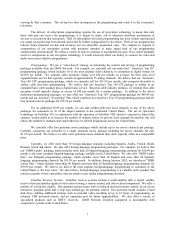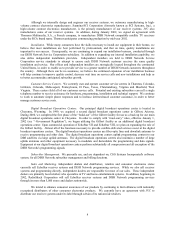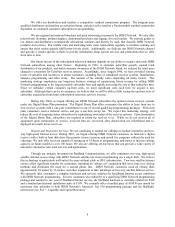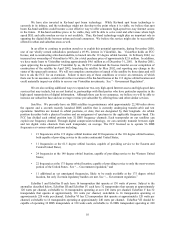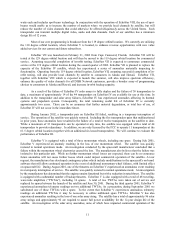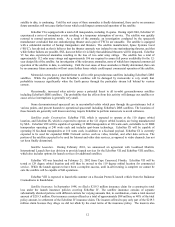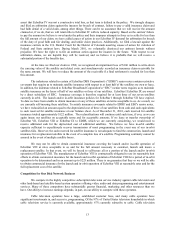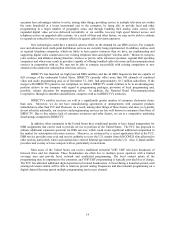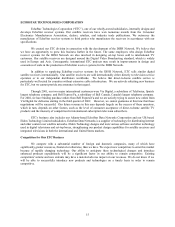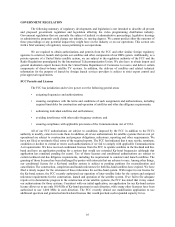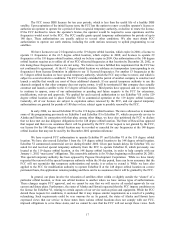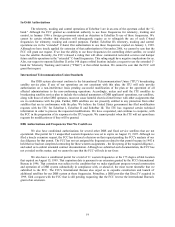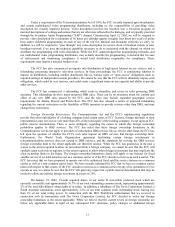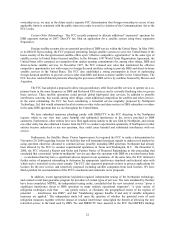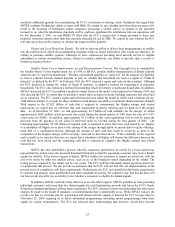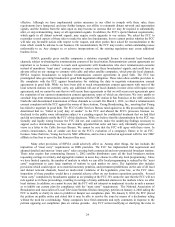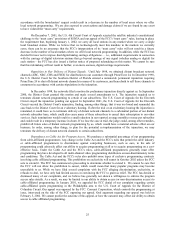Dish Network 2001 Annual Report Download - page 19
Download and view the complete annual report
Please find page 19 of the 2001 Dish Network annual report below. You can navigate through the pages in the report by either clicking on the pages listed below, or by using the keyword search tool below to find specific information within the annual report.17
The FCC issues DBS licenses for ten year periods, which is less than the useful life of a healthy DBS
satellite. Upon expiration of the initial license term, the FCC has the option to renew a satellite operator’s license or
authorize an operator to operate for a period of time on special temporary authority, or decline to renew the license.
If the FCC declined to renew the operator’s license, the operator would be required to cease operations and the
frequencies would revert to the FCC. The FCC usually grants special temporary authorizations for periods of up to
180 days. These authorizations are usually subject to several other conditions. We also must obtain FCC
authorization to operate our earth stations, including the earth stations necessary to uplink programming to our
satellites.
We have licenses to use 21 frequencies at the 119 degree orbital location, which expire in 2006; a license to
operate 11 frequencies at the 61.5 degree orbital location, which expires in 2008; and licenses to operate 29
frequencies at the 110 degree orbital location, which we believe expire in 2009. Our authorization at the 148 degree
orbital location requires us to utilize all of our FCC-allocated frequencies at that location by December 20, 2002, or
risk losing those frequencies that we are not using. We believe we have fulfilled this requirement but the FCC has
not confirmed its agreement. At the 61.5 degree orbital location we sublease six transponders (corresponding to six
frequencies) from licensee Dominion in addition to our 11 licensed frequencies. For another 13 frequencies at the
61.5 degree orbital location we have special temporary authority, which the FCC may refuse to renew, and which is
subject to several restrictive conditions. The FCC recently extended the permit of another company to construct and
launch a satellite that would use most of these additional channels. If our special temporary authority to use the
channels assigned to that other company does not expire sooner, it will be terminated if that company does actually
construct and launch a satellite to the 61.5 degree orbital location. Third parties have opposed, and we expect them
to continue to oppose, some of our authorizations or pending and future requests to the FCC for extensions,
modifications, waivers and approvals. We applied for and received authorization to test EchoStar VII at the 129
degree orbital location and to place EchoStar VII in commercial operation at the 119 degree orbital location.
Generally, all of our licenses are subject to expiration unless renewed by the FCC, and our special temporary
authorizations are granted for periods of 180 days or less, subject again to possible renewal by the FCC.
In early 2000, we moved EchoStar IV to the 119 degree orbital location. The move allowed us to transition
some of the programming previously on EchoStar I and EchoStar II to EchoStar IV, which can provide service to
Alaska and Hawaii. In connection with that plan, among other things, we have also petitioned the FCC to declare
that we have met our due diligence obligations for the 148 degree orbital location. The State of Hawaii has opposed
that request and there is no assurance that it will be granted by the FCC. If our request is not granted by the FCC,
our license for the 148 degree orbital location may be revoked or canceled for any frequencies at the 148 degree
orbital location that may not be used by the December 2002 operation milestone.
We have received FCC authorization to operate EchoStar IV and EchoStar VI at the 119 degree orbital
location. We have also moved EchoStar I from the 119 degree orbital location to the 148 degree orbital location.
EchoStar VI commenced commercial service during October 2000. Given past launch delays for EchoStar VII, we
asked for and received special temporary authority from the FCC to operate EchoStar II, which previously was
located at the 119 degree orbital location, at the 148 degree orbital location, in order to help comply with our
January 1, 2002 “must carry” obligations. This renewable authority is for 30 days beginning on December 28, 2001.
This special temporary authority has been opposed by Pegasus Development Corporation. While we have timely
requested the renewal of the special temporary authority within the 30-day period, there can be no assurance that the
FCC will not reconsider that temporary authorization and revoke it or refuse to extend it. While we have also
applied to the FCC for modification authority to operate EchoStar II at the 148 degree orbital location on a more
permanent basis, this application remains pending and there can be no assurances that it will be granted by the FCC.
In general, our plans involve the relocation of satellites either within or slightly outside the “cluster” of a
particular orbital location, or from one orbital location to another where we have various types of authorizations.
These changes require FCC approval, and we cannot be sure that we will receive all needed approvals for our
current and future plans. Furthermore, the states of Alaska and Hawaii requested that the FCC impose conditions on
the license for EchoStar VI, relating to certain aspects of our service such as prices and equipment. While the FCC
denied these requests for conditions, it cautioned that it may impose similar requirements as a result of a pending
rulemaking. Such requirements could be very onerous for us. In general, the states of Alaska and Hawaii have
expressed views that our service to these states from various orbital locations does not comply with our FCC-
imposed obligations to serve those states, and we cannot be sure that the FCC will not accept these views. Such


